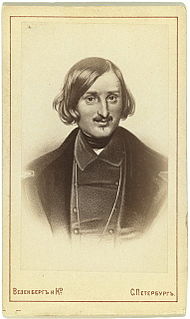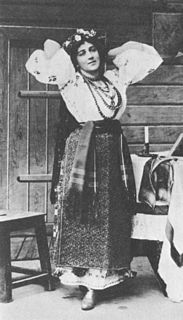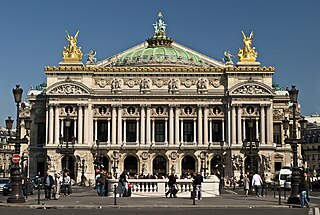
Nikolai Vasilievich Gogol was a Russian dramatist of Ukrainian origin.

The Nose, Op. 15,, is Dmitri Shostakovich's first opera, a satirical work completed in 1928 based on Nikolai Gogol's story of the same name (1836).

The Mariinsky Theatre is a historic theatre of opera and ballet in Saint Petersburg, Russia. Opened in 1860, it became the preeminent music theatre of late 19th-century Russia, where many of the stage masterpieces of Tchaikovsky, Mussorgsky, and Rimsky-Korsakov received their premieres. Through most of the Soviet era, it was known as the Kirov Theatre. Today, the Mariinsky Theatre is home to the Mariinsky Ballet, Mariinsky Opera and Mariinsky Orchestra. Since Yuri Temirkanov's retirement in 1988, the conductor Valery Gergiev has served as the theatre's general director.
"Diary of a Madman" is a farcical short story by Nikolai Gogol. Along with "The Overcoat" and "The Nose", "Diary of a Madman" is considered to be one of Gogol's greatest short stories. The tale centers on the life of a minor civil servant during the repressive era of Nicholas I. Following the format of a diary, the story shows the descent of the protagonist, Poprishchin, into insanity. "Diary of a Madman", the only one of Gogol's works written in first person, follows diary-entry format.

The Gambler is an opera in four acts by Sergei Prokofiev to a Russian libretto by the composer, based on the story of the same name by Fyodor Dostoyevsky.

May Night is a comic opera in three acts, four scenes, by Nikolai Rimsky-Korsakov from a libretto by the composer and is based on Nikolai Gogol's story "May Night, or the Drowned Maiden", from his collection Evenings on a Farm Near Dikanka.

Anastasia Volochkova is a Russian prima ballerina.
Evenings on a Farm Near Dikanka is a collection of short stories by Nikolai Gogol, written in 1829–32. They appeared in various magazines and were published in book form when Gogol was twenty-two. The writer was born in the village of Velyki Sorochyntsi near Poltava, and he spent his life in Ukraine up to the age of nineteen. He put his early impressions and memories of childhood into these pictures of peasant life. In a series of letters to his mother, he asked her to write down descriptions of village customs, dress, superstitions, and old stories. These were also used as primary sources.
"Ivan Fyodorovich Shponka and His Aunt" is part of the collection Evenings on a Farm Near Dikanka by Nikolai Gogol.
"The Carriage" is an 1836 short story by Nikolai Gogol, one of his shortest works. The story centers on the life of a former cavalry officer and landowner near a small Russian town. After reading the story, Anton Chekhov wrote to Alexei Suvorin, "What an artist he is! His 'Carriage' alone is worth two hundred thousand rubles. Sheer delight, nothing less."

Vakula the Smith, Op. 14, is an opera in 3 acts, 8 scenes, by Pyotr Ilyich Tchaikovsky. The libretto was written by Yakov Polonsky and is based on Nikolai Gogol's story Christmas Eve. It was written for composer Alexander Serov, who died in 1871 leaving only fragments of an opera on the subject.

Hadiach, sometimes spelled Hadyach, Gadyach, Gadiach, Haditch, or Hadziacz, is a city of regional significance in Poltava Oblast (province) in the central-east part of Ukraine. Located on the Psel River, the city is an administrative center of the Hadiach Raion (district), though administratively it does not belong to the raion.

This is a list of the works by Nikolai Gogol (1809–52), followed by a list of adaptations of his works:

Christmas Eve, is an opera in four acts with music and libretto by Nikolai Rimsky-Korsakov. Composed between 1894 and 1895, Rimsky-Korsakov based his opera on a short story, "Christmas Eve", from Nikolai Gogol's Evenings on a Farm Near Dikanka. The story had been used as the basis for an opera at least three times previously, including for Tchaikovsky's Vakula the Smith (1874). Oliver Knussen writes that "Rimsky is only interested in recreating the atmosphere of the folk-tale, fleshing it out for his stage pageant in a comparable way to Humperdinck in Hansel. Gerald Abraham, on the other hand, praises the vivid humanity and humour of Rimsky's setting, as well as its atmospheric strength.
The Lawsuit is a comic opera in one act by composer Svetlana Nesterova. The opera uses a Russian libretto by Vera Kupriyanova and the composer which is based upon Nikolai Gogol's fragmentary scene "The Lawsuit". The opera was commissioned by the Mariinsky Theatre along with two other new operas, Anastasia Bespalova's Shponka and His Aunt and Vyacheslav Kruglik's The Carriage, all based on stories by Gogol. The three operas premiered together on 21 June 2009 during the Mariinsky Theatre's summer festival.
The Carriage is an opera in one act by composer Vyacheslav Kruglik. The opera uses a Russian libretto by Vera Kupriyanova and the composer which is based upon the story of the same name by Nikolai Gogol. The opera was commissioned by the Mariinsky Theatre along with two other new operas, Svetlana Nesterova's The Lawsuit and Anastasia Bespalova's Shponka and His Aunt, all based on stories by Gogol. The three operas premiered together on 21 June 2009 during the Mariinsky Theatre's summer festival.
Vyacheslav Kruglik is a Russian composer and conductor. He is a member of the orchestral conducting faculty at the Saint Petersburg State University of Culture and Arts.
Anastasiya Bespalova is a Russian composer.

The Order of St. Vladimir, Third Class is an unfinished play by Nikolai Gogol, which he worked on between 1832 and 1834.
Dead Souls is a 1976 Russian-language opera in three acts by Rodion Shchedrin based on the verse-novel Dead Souls by Gogol, to a libretto by the composer. It was premiered at the Kirov in 1977, and overseas in Boston in 1988.













